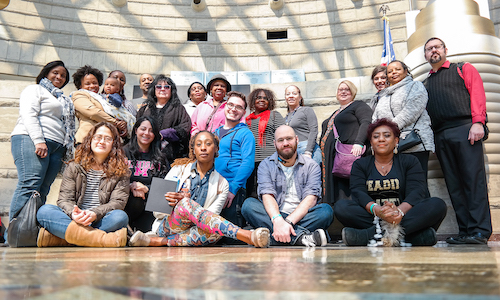
Two weeks before Detroit Public Schools Community District students were set to begin classes, the district was facing a troubling reality: The prospect of starting the school year with several hundred teacher vacancies. The shortage took few by surprise. It’s become a chronic problem in Detroit, as it has elsewhere in the state and across the country. It’s also a challenge experts say may require a patchwork of remedies—from better pay for teachers, to more innovative recruitment efforts, to broad re-investment in the educational system.
For the past several years, Education Associate Professor Karen Thomas-Brown has been developing a new tool to add to that toolbox of solutions. In sort of the inverse of the Teach for America model—where college graduates could earn teacher certifications in exchange for work in under-resourced districts—Thomas-Brown and her colleagues are attempting to grow teachers from inside the metro Detroit schools themselves.
To do this, they sought out people already working within the schools, like paraprofessionals and long-term substitute teachers, who were interested in earning their teacher certifications.
Specifically, Thomas-Brown’s team, which included Education Operations Lecturer Sharon Werner and Geology Professor Jacob Napieralski, identified 10 “emerging teachers,” mostly in Wayne County, who have already completed 30-60 hours of relevant college courses. They then provided them with coaching, academic counseling, professional development and funding for 15 credit hours of university coursework to count toward an elementary certification.
The underlying idea, Thomas-Brown said, is to provide educators who have a current stake in their schools with a suite of supports that helps them build capacity as teachers. That approach, they hope, can encourage career longevity in schools and districts that need it the most.
“Teach for America—that is a crash course approach,” she said. “This project is focused on the long-term. We’re meeting with our emerging teachers every week, connecting them with the courses, mentors and training they need. There is a lot more hand-holding involved, but we’re trying to think 10 steps down the road and create teachers who are stakeholders.”
Another critical component of Thomas-Brown’s project is a group of 20 mentor teachers. These are certified educators who work in the same or neighboring building as an emerging teacher and provide professional support. In exchange for their coaching, the mentor teachers receive funding for graduate-level and professional development courses, which are required to maintain their own certifications or earn promotions. This, she said, helps certified teachers who are already invested in their schools sustain their careers there.
So far, Thomas-Brown is hopeful about the outcomes of the project. Pre- and post-program assessments detail several improvements in teacher performance. And more than 50 percent of mentor teachers said they were able to renew their certifications using the graduate credits and professional development training.
Thomas-Brown said going forward, emerging teachers may face one of the bigger challenges—namely, figuring out how to fund their remaining coursework once they exhaust the 15 free credits provided by the program.
“But that’s almost $30,000 per person that we’ve invested,” Thomas-Brown said. “If someone gave you $30,000 toward your education, that’s motivation to invest a little bit yourself, right?”
It appears so: All 10 of the program’s emerging teachers now say they intend to continue working toward their teaching certifications. Thomas-Brown said they won’t be alone for that final leg of the journey either. Her team now is turning its attention toward connecting them with the scholarships, financial aid and academic counseling they’ll need to officially join the ranks of certified metro Detroit teachers.






